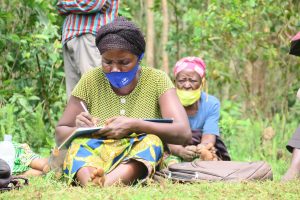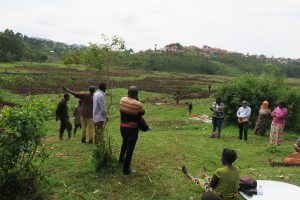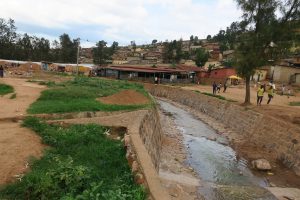Kigali, Rwanda; Feb 01, 2022 – GGGI Rwanda is a Delivery Partner supporting the Rwanda Environment Management Authority (REMA) – the National Designated Authority (NDA) – on a twenty-four-month project “National Adaptation Plan (NAP) Readiness Support for Building Flood Resilience Capacities in Rwanda.” The GCF NAP Project has a focus on enhancing capacity for integrated flood and landslide management in urban areas. The GCF NAP project aims to build upon existing strategies and policies to deliver coordinated and targeted multi-stakeholder engagement between agencies for effective flood and landslide planning and prevention in the most vulnerable zones of Rwanda (GCF NAP project sites are in Rusizi District in the Western Province, Huye and Kamonyi Districts in the Southern Province and in the City of Kigali.

The GCF NAP project recognizes the importance of understanding the stakes for gender equality and social inclusion mainstreaming in the project outcomes and outputs. It is within this framework that a Gender Equality and Social Inclusion (GESI) assessment was conducted to inform the NAP project on existing capacities and systems to support the mainstreaming of GESI in the project.
Rwanda is prone to floods and landslides due to its geographical features and climate profile. More specifically, 42% of the country is classified as having moderate to very high susceptibility to landslides. Among the population exposed to landslides, an average of 40% are poor, as in most cases the poorest tend to settle in hazard-prone locations due to issues of affordability for plots that are located in safe zones. Of those exposed at very high susceptibility, 86% are considered active (working) and 14% are inactive (dependent); with the population exposed at high susceptibility considered active at 85% and inactive at 15%. The government of Rwanda (GoR) has embarked on a process of urbanization, making the need for information, and particularly gender related information, on environment and climate change (E&CC) risks, mitigation measures, and responses essential.
In terms of gender mainstreaming, the National Roadmap for Green Secondary City Development includes a particular focus on integration of gender perspectives in city planning, noting that, “the way a city is planned, designed and governed must permit both women and men to fully exercise their citizenship, be active members of the community and conduct their daily activities. The design of urban infrastructure (such as roads, public places, parks, bus stops, water point and waste collection points) is critical and must integrate a woman’s perspective.”
In terms of national level policies and systems, building on the understanding that GESI mainstreaming is a process that requires the policy, political, and legal environment to be conducive, the assessment found strong foundations underpinning GESI mainstreaming across different areas of environment and climate change in Rwanda. Firstly, the principle of equality of all Rwandans is enshrined in the Constitution of the Republic of Rwanda (Article 9), the supreme law of the country, compelling all sectors to mainstream gender equality and social inclusion in their activities. Gender and environment and climate change (E&CC) are transversal themes of the National Strategy for Transformation (NST1), a strategic document illustrating the Seven Years’ Government Programme for the period 2017-2024. Furthermore, gender equality is enshrined in the principles of the new E&CC Policy, which aims at fostering inclusiveness. Through its principle of inclusiveness, the Policy urges and encourages the effective involvement of women and youth in E&CC management, intervention, and decision-making as essential. Further, this policy emphasizes human rights as central to sustainable development, specifically gender equality and women’s empowerment.
In the infrastructure and urban planning sector, Rwanda adopted a National Urbanization Policy to plan ahead for economic growth that ensures a good quality of life for its citizens. Social inclusion is one of the guiding principles of the policy, setting the scene for people-centered and gender sensitive urbanization. Recognizing that urbanization needs to take disaster management and resilience into account, this Policy highlights the role of the community. It recommends understanding specific vulnerabilities through conducting community risk assessments, while also educating the community on key areas, including the use of early warning systems. It is worth noting that this Policy recognizes the risk of floods in urban settings, sets up preventive measures and urges the inclusion of women and girls in urban planning, design and management.
With support from GGGI, the Ministry of Infrastructure (MININFRA) developed an Infrastructure Gender Mainstreaming Strategy (IGMS). In its draft form, the IGMS has provisions for urbanization. Considering the linkage of urbanization with other sectors, the implementation plan of the different pillars of the National Urbanization Policy are set to be championed by different line ministries, including the Ministry of Gender and Family Promotion (MIGEPROF), (MINIFRA, and other key institutions like Rwanda Transport Development Agency (RTDA). The GESI assessment also noted a number of institutional level structures supporting GESI mainstreaming including the existence of staff appointed as Gender Focal Points (GFPs) in several institutions as well as a staff responsible for gender at the district level.
At the community level, men and women residing or with livelihood activities in the project sites were engaged equally on discussions meant for understanding their experiences in relation to floods and/or landslides. They were consulted to determine acceptable levels of risk and to ensure the reflection of all members of the visited communities. This considered the inclusion of women and men facing different vulnerabilities to and impacts from hazards.
The GESI assessment highlighted how women and men differ in how they experience, respond to, and recover from disasters. Women and people from disadvantaged backgrounds living in the project sites were the most affected by floods and landslides. For instance, Rusizi District, one of the NAP sites, is in an urban and connected area. However, due to the lack of water channels, the stormwater floods houses located downstream where the poorest live, with a constant fear carried by women for their children who are at the risk of being washed away by stormwater. For the project sites where stormwater from urban settings floods the agricultural irrigation schemes downstream, women are also the most affected. The irrigation schemes are used by cooperatives, predominately composed of women, who do not have alternative unskilled jobs to turn to when they lose their harvest due to floods. This is the case for Gihundwe in Rusizi District, Rwabayanga in Huye District, and Bishenyi in Kamonyi District.
In Kigali City on the other hand, one of the project sites is in Mpazi catchment, a high-density area inhabited by people with low income. The current situation of the existing channel carries an extra negative effect for women and children. To list only a few of the issues resulting from the current status of the channel, the destroyed sections become ponds where children and other people physically weakened by health conditions, age, disability or any other people reason. The ponds are often infested with mosquito larvae, spreading malaria and resulting in additional care burden for women who must take care of sick family members. In addition, consulted male and female MPAZI community members reported that women are targeted by thieves hiding in the covered sections of the channel.
The GESI assessment noted the gendered differences in men’s and women’s perspectives and recommends that these perspectives and experiences are recognized so that gender inequalities are not perpetuated in urban design and planning. For instance, while all the community members in Rusizi District consider that a stormwater channel will boost economic livelihoods in the site, women expressed concern that an open channel will be deadly for their children. The GESI assessment collected recommendations from the consultations and these have been incorporated into the NAP GESI Action Plan and Monitoring and Evaluation Frameworks.

The NAP project proposes to use these key guiding documents as the basis for a gender assessment and development of a GESI action plan. The action plan will facilitate the mainstreaming of gender and social inclusion considerations in all activities across all outcomes, including identification and implementation of specific gender sensitive and targeted interventions, and develop specific GESI indicators. In line with the above, more information about the capacities of stakeholders for gender integration in floods and landslides management needed to be assessed.
In this framework, a GESI assessment was undertaken with the following objectives:
• Understanding the capacity that the stakeholders have for mainstreaming GESI in their functional areas of work related/relevant to floods and landslides risk management.
• Understanding the extent to which the existing institutional system is supporting GESI mainstreaming in the areas of floods and landslides risk management.
• Mapping where the stakeholders are on their journey towards gender equality and identifying activities to support them that can be integrated into the project’s LogFrame.
• Understanding the GESI issues faced by communities in the catchment areas of the project to inform the GESI action plan that takes into accounts the differentiated impacts of the disasters and interventions geared towards response, prevention, and protection.
This GESI assessment report includes progress on the following deliverables and will be updated with inputs from the technical assessments and the private sector engagement process:
1. Findings from a gender assessment of capacities and systems that the relevant stakeholder institutions have for GESI mainstreaming with a cross-over into their potential influence on the outcomes and objectives of the project
2. Draft gender-disaggregated indicators
3. An assessment and identification of potential gender-differentiated impacts of the project with emphasis on reviewing national strategic documents
4. Draft action plan based on the gender assessment
5. Draft Monitoring and Evaluation (M&E) Plan
In every society, men’s and women’s roles and responsibilities are gendered, Recognition of gendered differences should be recognized in urban planning, to ensure that gender inequalities are not perpetuated. With this consideration, men and women residing or with livelihood activities in the project sites were engaged equally in discussions to generate an understanding of their experiences in relation to floods and/or landslides and determining acceptable levels of risk. These consultations aimed to ensure the reflection of all members of the visited communities, focusing in particular on the inclusion of women and men facing different vulnerabilities to and impacts from hazards.
Impacts are significant for the population, whether directly (such as loss of life or property), or indirectly, (such as damage to public institutions like schools). For the period 2016-2018, Kamonyi District, one of the intervention areas of the NAP project, ranked highest among the districts with a high number of damaged properties and hectares of crops.
Gender inequalities are also exacerbated during disasters. Women members of cooperatives reported being differently affected by floods than their male counterparts. Interviewed women reported that, when crops get washed away or buried by floods, the male members of the cooperatives turn to neighbouring urban settlements for alternative unskilled jobs and keep earning a living. The unskilled jobs available for men were reported to include carrying loads at the market, wage farming, and working on construction sites as mason aids. However, for women there are limited alternative unskilled readily available jobs, which also pay less than the profits from the cooperative. For the unskilled jobs available to both women and men, employers prefer men and completely refuse to hire women with young children.
The involvement of community members as stakeholders informed the assessment about the current issues caused or associated with flooding and landslides in the NAP sites, as well as the solutions proposed by community members. These have been formulated to account for the differentiated roles and experiences of women and men as well as the different financial capacity means of the residents or farmers in agricultural areas in the project sites. The following are recommendations for community level interventions:
1. In relation to the construction of water channels, residents of affected areas have expressed the need to construct covered water channels to ensure children’s safety;
2. Engage community members in the inspection of infrastructure development projects meant for the common good. This is a means to increase community ownership, improve the sustainability of the infrastructure, and avoid any potentialcorruption.
3. Subsidize water harvesting plastic tanks for harvesting rainwater so that the tanks are widely used upstream to prevent flooding that results from storm water run-off in urban settings.
4. To respond to the issue of flooded latrine pits, a suggestion was made to subsidize and incentivize the use of septic plastic tanks and, at the same time, promote the skills for waste management and the private sector solutions.
5. From a social inclusion perspective, there is a need to recognize that people with limited financial means depend on Mpazi water for daily use, and that rehabilitating Mpazi may result in reducing access to its natural spring water, ensure that access to clean water is provided to local residents with limited financial means.
6. A suggestion was also formulated by Mpazi community members, to reconsider the fee charged for household waste collection in relation to the household capacity to that the household with limited financial capacity have access to this service and are not enclined to dump their waste in the water channels.
City of KIGALI-community members have suggested to widen the Mpazi water channel, but also to cover it so that their children can no longer go and swim there or the thieves do not hide in those. Of the special measures suggested, are also included the consideration of ones Ubudehe categories when setting up the fees for community initiatives, such as the waste collection or the rehabilitation of the channel. There was a challenge with conventional solutions to reduce water runoff as Mpazi catchment is densely populated with low income residence without a space for setting up tanks for harvesting water.
KAMONYI -A proper assessment was part of the solutions suggested by agricultural experts who operate in the areas of Bishenyi valley. They report that it is hard to just come up with solutions without a proper study because that is a large scale project and it needs a proper study. Some initiatives that were not grounded on tangible studies failed, and they think this is a time for a proper study for addressing the issue. Another recommendation is to design a large water channel that goes through the valley, and also from the urban built area and throughout the valley.
HUYE- residents build temporary houses to be washed away by the flood and thus, protecting the house in which they live. As a recommendation, the residents wish to see the channel widened and covered.
RUSIZI -The co-operative members believe that the construction of what is termed as “full option roads” (inclusive of covered drainage and water retention features) would solve the main problem. This would include a channel for the water to flow through the marshland without damaging the crops.

To read the full report : Gender Assessment of Stakeholders Report for GCF National Adaptation Plan (NAP) Project on Building Flood Resilience Capacities in Rwanda
To watch the highlights video from the consultations use link:
Highlights video : Gender Equality & Social Inclusion (GESI) Stakeholders Consultation for GCF NAP Project in Rwanda
Kamonyi GESI Stakeholders Consultation
Rusizi GESI Stakeholders Consultation
Huye GESI Stakeholders Consultation
City of Kigali GESI stakeholders Consultation